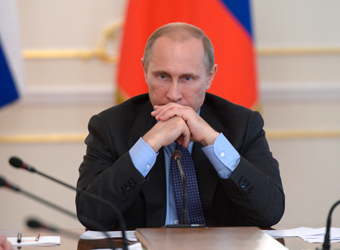Russians voted in a presidential election on Sunday set to give Vladimir Putin a runaway victory, the only possible blemish for the Kremlin being if large numbers of voters do not bother taking part because the result is so predictable.
Opinion polls give Putin, the incumbent, support of around 70 percent, or nearly 10 times the backing of his nearest challenger. Another term will take him to nearly a quarter century in power — a longevity among Kremlin leaders second only to Soviet dictator Josef Stalin.
Putin’s opponents alleged officials were trying to inflate the turnout.
Many voters credit Putin, a 65-year-old former KGB spy, with standing up for Russia’s interests in a hostile outside world, even though the cost is confrontation with the West.
A row with Britain over allegations the Kremlin used a nerve toxin to poison a Russian double agent in a sleepy English town — denied by Moscow — has not dented his standing.
The majority of voters see no viable alternative to Putin: he has total dominance of the political scene and the state-run television, where most people get their news, gives lavish coverage of Putin and little airtime to his rivals.
Galina Zhukova, a pensioner, came to polling station number 1512 in Zelenodolsk, about 800 km (500 miles) east of Moscow, with her husband, Alexei. They arrived soon after the doors opened.
“We voted for Putin. Things are all right for us,” said Alexei. “And there’s no one else to vote for,” said Galina.
A day of voting across Russia’s 11 time zones began at 2000 GMT on Saturday on Russia’s eastern edge, in the Pacific coast city of Petropavlovsk-Kamchatsky.
There, voters were handed small plastic flags with the slogan: “I love Kamchatka. We are the first.”
Voting will run until polls close at the westernmost point of Russia, the Kaliningrad region on the Baltic Sea, at 1800 GMT on Sunday.
SHOO-IN CONTEST
A March 9 survey by state-run pollster VTsIOM gave Putin, who was first elected president in 2000, support of 69 percent. His nearest rival Pavel Grudinin, the Communist Party’s candidate, is on just 7 percent.
The first politician in years to challenge the Kremlin’s grip on power, Alexei Navalny, is barred from the race because of a corruption conviction he says was fabricated by the Kremlin.
He is calling for a boycott of the election, saying it is an undemocratic farce, and deploying supporters to collect evidence of anyone rigging the ballot to inflate turnout and support for Putin. The Kremlin and election officials say any fraud will be stamped out.
In an address to the nation broadcast on national television on Friday, Putin said voters held the fate of the country in their hands and urged them to vote.
A low turnout would diminish Putin’s authority in his next term, which, under the constitution, has to be his last.
“There is no intrigue. I do not see any point for me in going to the election,” said Alexei Khvorostov, a resident of Krasnodar, in southern Russia.
Yevgeny Roizman, a Kremlin opponent who is mayor of the industrial city of Yekaterinburg, said officials were using bribes and inducements to persuade people to vote.
“They’re herding the whole country to the polling stations,” Roizman, a rare example of an elected official opposed to the Kremlin, said in a video blog. “It’s degrading… We’re not sheep.”
In the Khabarovsk region, on Russia’s Pacific coast, officials delivered supplies of eggs, tinned peas and frozen pike to polling stations. It will be sold to voters at a discount of between 10 and 30 percent compared to prices in local shops.
“By doing this we hope to attract voters to the polling stations and we think we can increase turnout,” said Nikolai Kretsu, chairman of the consumer market committee in the regional administration.
“The second objective is to strengthen allegiance toward the authorities.”
source: Reuters



